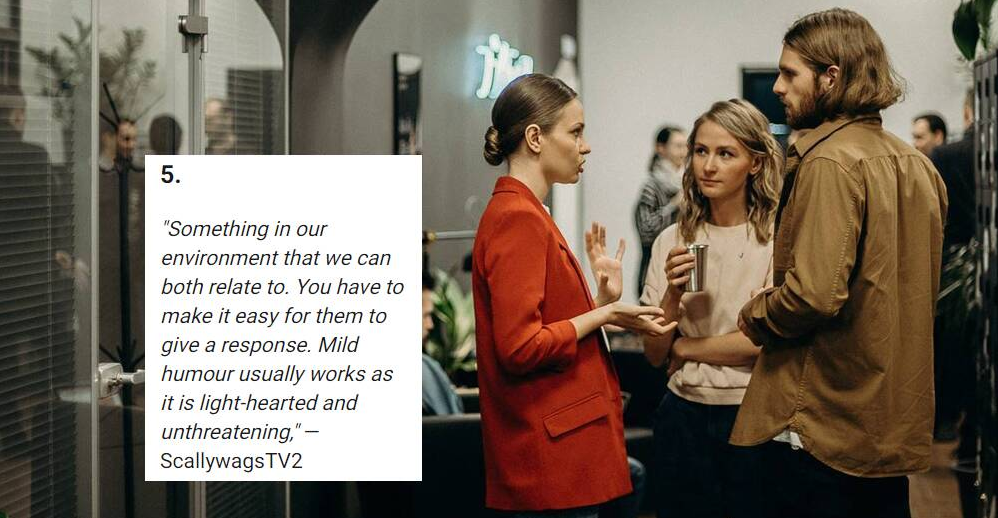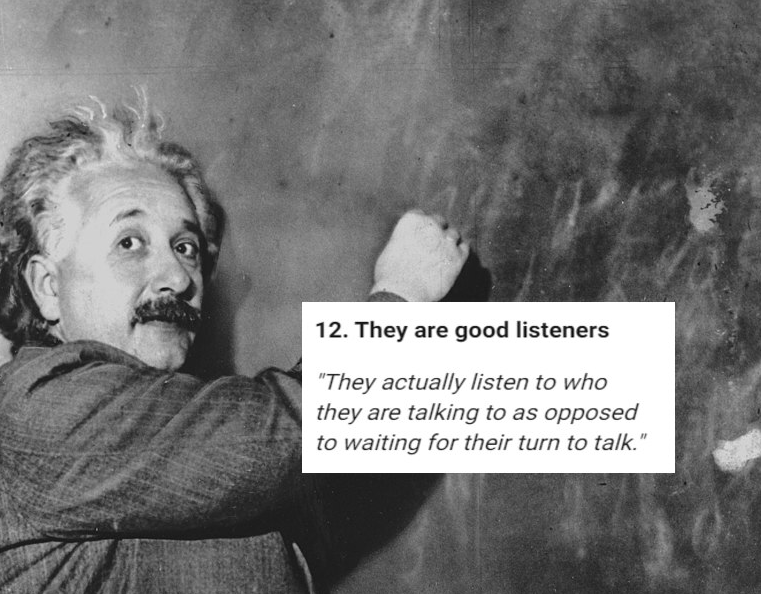A lot of people feel uncomfortable starting up conversations with strangers in social settings. It’s not that they don’t want to meet people, they’re just not sure what to say.
There’s an art to small talk and some people are incredibly at ease starting up a conversation and coming up with things to say. They know how to get things moving without being obvious and seem to do this effortlessly.
A Reddit user named Blugged Bunny asked the online forum “What is your go-to ‘small talk’ topic with strangers?” and although the question may not have intentionally been to help introverts, there were a lot of great suggestions for people who are uncomfortable making small talk.
It seems the best ideas are questions and statements that are about the current setting and situation. The truly great small talk artists know that the best way into a conversation is to allow the other person to talk about themselves.
It’s also helpful to bring up topics that everyone can speak to whether that’s family, pets, weather, sports or articles of clothing. I once knew a guy who was single and whenever he went out he wore a “Livestrong” bracelet that he got from Lance Armstrong’s cancer charity. He told me that it “Gives women an easy conversation-starter if they want to talk to me. They’ll ask, ‘Why are you wearing that? Isn’t Lance Armstrong, a cheater?’” That would begin a great debate over whether Armstrong was such a bad guy, after all he’s done for people with cancer.
Here are 14 of the best go-to small talk topics from the Reddit thread.
1.
“Make an observation. Literally anything. It helps if it’s something about them like an article of clothing that catches your eye, something they’re doing, anything that you can relate to or are interested in but it doesn’t have to be. It can be something in the environment that is drawing both of your attention. People bullshit about the weather all the time. Once you’ve got something to work with, the key is to ask. … Let them do the talking. People love talking about themselves. You learn some light-hearted things about the stranger, they feel more comfortable, and you can add bits and bobs of your own experiences in response so they get to know you too. It works in literally any situation. From an elevator ride to a first date. It’s so easy to personalize small talk and it makes it so much less uncomfortable.” — arrocknroll.
2.
“Have you ever tried Ayahuasca?” — KarmicBreath
This comment kicked off a funny response from Sinsaraly:
“Love this. My friend once spent a few hours in a car with poet Allen Ginsberg. The very first thing he said to her was “what drugs do you do?”
3.
“The weather is a good one. everyone shares it. I’m a guy and i do not give one shit about professional sports or cars and it’s like a social disability.” — Mr_Mojo_Risin
4.
Hobbies. “Pretty much everyone has something they’re either super passionate about or really rather good at, so a conversation about hobbies pretty much always moves from ‘small talk’ to ‘genuine interest’ pretty damn fast.” — Trashpanda692
5.
“Something in our environment that we can both relate to. You have to make it easy for them to give a response. Mild humour usually works as it is light-hearted and unthreatening.” — ScallywagsTV2
6.
“Usually people love to talk about themselves, so a few questions about them and some follow up questions to their answers usually does it.” — I_Can_See_The_Music
7.
“I try to think of random things. Like a favorite animal or star, talking about something in the room. Usually is stupid dad jokes.” — UncreativeGlory
8.
“I try to come up with questions regarding the situations we are in. Like, ‘Hey you know any good place around here to get a decent meal?”‘ — Chromerix
9.
“Food. People typically love food. I mention I’m new/newer to an area. And ask them what they like, where they eat out. Usually works and people have their choices validated and I always know where to find good local snacks.” — TheProfWife
10.
“If it’s a woman, I’d compliment them on something I like (bag/shoes/makeup/a book they’re reading) and then try to find common ground for there. For men, I’d try something neutral so it doesn’t seem like I’m trying to hit on them. Perhaps weekend plans, work etc.” — llovejoy1234
11.
“Biggest animal you think you could take in a fight.” — RizziJoy
12.
”I usually bring up home renovations. Especially if the small talk confined us to a space for quite some time. Like a wedding, business conference etc. I can always find people who are not only working on different parts of their homes, but enjoy talking about them. Learned a thing or two along the line as well!” — Calm-Ad
13.
“Did you ever hear the Tragedy of Darth Plagueis the Wise?” — HowToDoNot
14.
“F.O.R.D. Family/Occupation/Recreation/Dreams
Family: Do they have kids? If so, people love to talk about their kids. How many, what ages, what grades are they in in school? If they are older (High School/College) what are they studying? Do they play sports/music? If family is not a comfortable subject (you don’t feel like asking about spouse and kids and such) then move on to Occupation
Occupation: What do they do for a living? How long? Do they like it? Did they go to school for it? How did they get into it?
Recreation: What do they like to do in their free time? Hobbies? What sports do they like to watch? Do they play any sports? Do they do anything active? Do they do anything artistic or musical?
Dreams: What are they currently looking forward to in life? Is there a big vacation coming up? Are the kids graduating from School? Are they training for a major athletic event (marathon or some other competition)?
This is usually my go-to when making small talk and it’s usually enough to get me to some sort of common ground that our conversation can build off organically.” — khamylion
This article originally appeared on 5.5.22





































